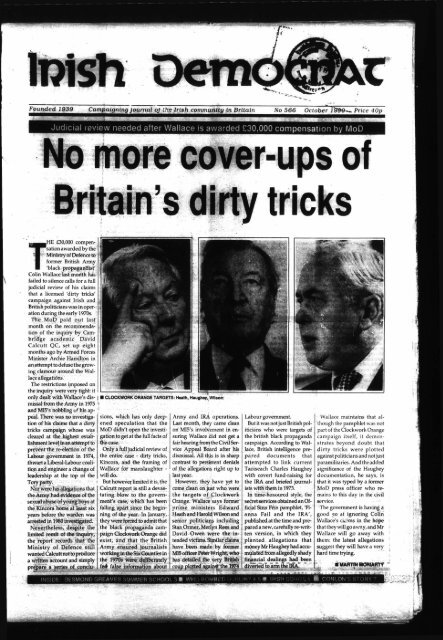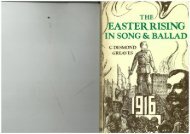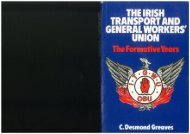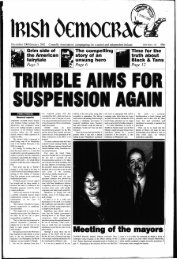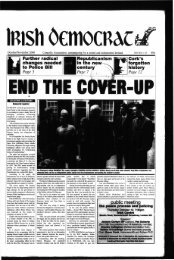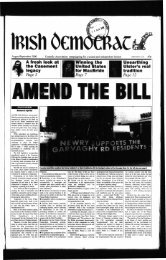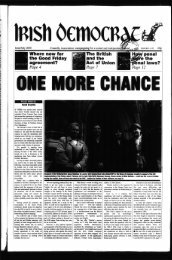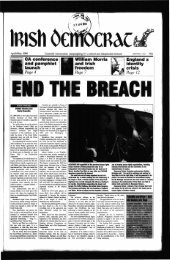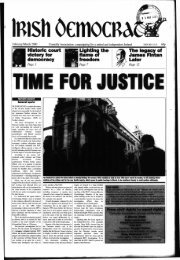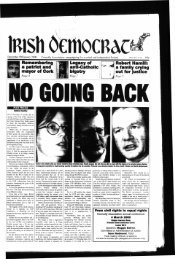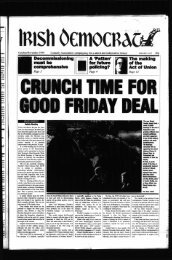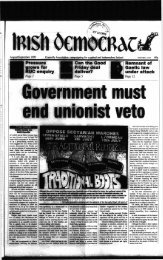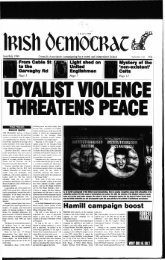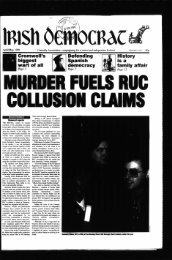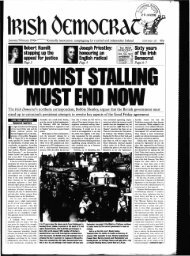Irish Democrat October 1990
Create successful ePaper yourself
Turn your PDF publications into a flip-book with our unique Google optimized e-Paper software.
Founded 1939 Campaigning journal of the <strong>Irish</strong> community in Britain No 566 <strong>October</strong> Price 40p<br />
judicial review needed after Wallace is awarded £30,000 compensation by MoD<br />
Labour government.<br />
But it was not just British politicians<br />
who were targets of<br />
the british black propaganda<br />
campaign. According to Wallace,<br />
British intelligence prepared<br />
documents that<br />
attempted to link current<br />
Taoiseach Charles Haughey<br />
with covert fund-raising for<br />
the IRA and briefed journalists<br />
with them in 1973.<br />
In time-honoured style, the<br />
secret services obtained an Official<br />
Sinn F£in pamphlet, 'Fianna<br />
Fail and the IRA',<br />
published at the time and prepared<br />
a new, carefully re-written<br />
version, in which they<br />
planted allegations that<br />
money Mr Haughey had accumulated<br />
from allegedly shady<br />
financial dealings had been<br />
» mi T/r» . - «a» »•• rdt><br />
diverted to arm the IRA.<br />
Wallace maintains that although<br />
the pamphlet was not<br />
part of the Clockwork Orange<br />
campaign itself, it demonstrates<br />
beyond doubt that<br />
dirty tricks were plotted<br />
against politicians and not just<br />
paramilitaries. And the added<br />
significance of the Haughey<br />
documentation, he says, is<br />
that it was typed by a former<br />
MoD press officer who remains<br />
to this day in the civil<br />
service.<br />
The government is having a<br />
good 50 at ignoring Colin<br />
Wallace's ckims in the hope<br />
that they will go away, and Mr<br />
Wallace will go away with<br />
them: the latest allegations<br />
suggest they will have a very<br />
hard time trying.<br />
DE<br />
DESMOND GREAVES<br />
HOOi. 3 m WI-
NEWS<br />
i*<br />
E D I T O R I A L ..<br />
Another step<br />
nearer freedom<br />
Top speakers lined up for CA<br />
trade union seminar<br />
Anti-national revisionism in Ireland is just one aspect of a global phenomenon<br />
THERE HAVE BEEN false dawns before, hopes for<br />
justice raised only to be dashed down, but with the<br />
current disarray within the police and judiciary<br />
over the referral back to the Court of Appeal of the<br />
Birmingham pub bombings case, it is devoutly to be<br />
wished that the six men who have between them spent<br />
a total of 96 years in jail for a crime they didn't commit<br />
will soon be able to walk free.<br />
But the outcome of the hearing, whenever it is heard,<br />
is by no means a foregone conclusion yet: it is difficult<br />
to be confident when there are so many reputations at<br />
stake, not least that of the Lord Chief Justice, Lord Lane.<br />
Lane it was, it will be remembered, who dismissed the<br />
men's last appeal in January J988 with such contempt. , r<br />
The court had seen the comprehensive demolition of<br />
the forensic evidence, had heard fresh evidence of the<br />
use of torture to extract confessions, had, indeed, witnessed<br />
a police woman return to the stand to admit perjuring<br />
herself under pressure, but Lord Lane<br />
maintained that the longer the appeal had continued,<br />
the more convinced he had become of the Crown's case.<br />
Lane's mind isn't just closed on the case: he has<br />
locked the door and thrown away the key. For that reason,<br />
he can have no business hearing the men's appeal:<br />
he will just have to stand down.<br />
Of course, there may be no hearing at all: the establishment<br />
might choose to 'do a Guildford' and not contest<br />
the appeal. But however glum the West Midlands<br />
are reported to be, whatever difficulties the referral mat<br />
be causing senior members of the judiciary, this is no<br />
time for inaction. Quite the reverse. Sustained political<br />
pressure has got the Birmingham Six one step nearer<br />
freedom: maintenance of the momentum can only help<br />
ensure a just outcome.<br />
Whether or not the appeal is contested, whenever a<br />
hearing is set, whoever presides, there will remain the<br />
question of how it happened in the first place. And in<br />
this regard, one piece of legislation forever associated<br />
with the Birmingham pub bombings can have no future<br />
on the statute books. Calls for the replacement of the adversarial<br />
judicial system with magisterial investigation<br />
are indeed valid enough, but much more urgent remains<br />
the repeal of the PTA.<br />
MM<br />
IRISH DEMOCRAT: journal of the Connolly Association<br />
EDITORIAL BOARD: Gerard Curran, Conor Foley<br />
(news), Martin Moriarty (production), Peter Mulligan<br />
PUBLISHED BY: Connolly Publications Ltd., 244-46<br />
Gray's Inn Road, London WC1 8JX. Tel: 071-833 3022<br />
Join the CA!<br />
If you want to join the campaign for <strong>Irish</strong> unity and independence,<br />
then join the Connolly Association. Only the Connolly Association<br />
has got the staying power, the Ideas and the Influence the campaign<br />
needs.<br />
Membership costs a mere £8 a year (£10 for couples and £4 for<br />
students, unemployed and pensioners) and includes a free subscription<br />
to the <strong>Irish</strong> <strong>Democrat</strong><br />
NAME<br />
ADDRESS<br />
j<br />
'<br />
MANY CONGRATULATIONS on<br />
the September <strong>Irish</strong> <strong>Democrat</strong> article<br />
dealing with the Construction Safety<br />
Campaign fight against the growing<br />
number of deaths occurring on sites<br />
up and down the country. It is to be<br />
hoped the CSC goes from strength to<br />
strength in its work to prevent these<br />
unnecessary dea ths.<br />
We would like, however, to draw ,<br />
your readers'attention to other prob- i<br />
lems that workers face at work,<br />
namely the chronic diseases that develop<br />
over the yearsand lead to workers<br />
dying early or having to retire<br />
through work-related ill-health.<br />
For the past 12 years, the Sheffield<br />
Occupational Health Project has<br />
talked to thousands of workers about<br />
their working conditions and the effects<br />
they have on them. This has<br />
included <strong>Irish</strong> workers whose jobs<br />
have been in the 'traditional' areas -<br />
building sites, mains laying, civil engineering<br />
- and smaller numbers in<br />
Sheffield steel and engineering<br />
plants. Also included have been <strong>Irish</strong><br />
women who in the main have<br />
worked in the NHS.<br />
Results from our interviews show<br />
evidence of high levels of industrial<br />
disease that cover a wide range of<br />
problems, including lung disease, industrial<br />
deafness and tinnitus, vibration-induced<br />
whitefinger, dermatitis<br />
and strain injuries. The biggest problems<br />
with these injuries - apart from<br />
some of the more obvious ones like<br />
dermatitis - is their insidious nature.<br />
They often develop over a number of<br />
years and are nearly always associated<br />
with age. 'I'm getting old', 'I've<br />
got rheumatics', 'I've got arthritis'<br />
are workers' common descriptions of<br />
illness, and when these symptoms<br />
are related to their GPs - who in the<br />
main have very little knowledge of<br />
industrial disease - misdiagnosis<br />
often occurs. This leads to workers<br />
being denied proper benefits and<br />
often hinders claims for damages.<br />
More serious than this, however, is<br />
that because of misdiagnosis, the<br />
high incidence of work-related illhealth<br />
is not documented sufficiently<br />
CLARE SHORT MP (left), <strong>Irish</strong> Labour<br />
TD Emmet Stagg and Kevin<br />
McNamara, the British Labour<br />
Party's frontbench spokesperson<br />
on Northern Ireland, wHI ail<br />
be speaking at next month'strode<br />
union seminar, '<strong>Irish</strong> unity:<br />
strategies for consent', organised<br />
by the Connolly Association.<br />
They will be joined by, among<br />
others, Sean Redmond, the leading<br />
member of Dublin4>ased<br />
Trade Unionists for an Independent<br />
and United Ireland, and<br />
Kevin McCorry, convenor of the<br />
Belfast-based Campaign for<br />
Democracy.<br />
The seminar has already attracted<br />
substantial interest and a<br />
LETTERS TO THE EDITOR<br />
and allows for the situation to continue<br />
from one generation to another.<br />
If any readers want to know more,<br />
they can contacts us at Sheffield Occupational<br />
Health Project, Mudford<br />
Buildings, 37 Exchange Street, Sheffield<br />
S2 5TR. Tel: 0742-755760.<br />
Sheffield Occupational<br />
Health Project<br />
Gulf crisis<br />
POLITICUS'S ARTICLE in September's<br />
<strong>Democrat</strong> on the Gulf crisis<br />
mates the mistake of simply backing<br />
the forces that are fighting imperialism<br />
while ignoring their methods.<br />
Peace cannot be maintained if the<br />
anti-imperialist forces ignore international<br />
law when they want to invade<br />
a country to prop up a friendly<br />
government or to topple a reactionary<br />
regime and only support international<br />
law when it is broken by the<br />
imperialists. We will get nowhere by<br />
mirroring the methods of imperialism.<br />
Nor should we follow in imperialism's<br />
wake only to be let down<br />
when it decides that international<br />
law does not meet its own interests.<br />
Any solution to the current conflict<br />
should help to lay the basis for a progressive<br />
solution to all such conflicts.<br />
The main issue at stake is: how<br />
should territorial disputes be resolved?<br />
And the answer is: through<br />
the mechanisms of the United Nations.<br />
The UN Charter provides the best<br />
framework for the peaceful resolution<br />
of such disputes. It is in the longterm<br />
interests of the forces opposed<br />
to imperialism to strengthen the UN,<br />
which provides, in theory, the structure<br />
for the peaceful resolution of territorial<br />
disputes. The difficulty is in<br />
enforcing UN policies.<br />
If the UN is used as the agency for<br />
the solution of the conflict, then Politicus's<br />
article Is way off the mark.<br />
Iraq's annexation of Kuwait violates<br />
Article 2 of die UN charter which<br />
states: "AO members shall refrain in<br />
their International relations from the<br />
number of trade union organisations<br />
are sponsoring the event,<br />
from local government union<br />
NALGO's north-west district<br />
council to several trades councils<br />
and a number of trade onion<br />
branches.<br />
No trade union activist keen to<br />
develop the discussion about<br />
how Britain could leave Ireland<br />
can afford not to be at the seminar.<br />
Delegate fees are £5, and sponsoring<br />
the seminar costs a trades<br />
counell £10 and a trade union<br />
branch £20. Details tram: Trade<br />
union seminar, Connolly Association,<br />
244-246 Gray's Inn Road,<br />
London WC1X 8JX. Tel: 071-833<br />
9368<br />
threat or use of force against the territorial<br />
integrity or political independence<br />
of any state." J.<br />
The UN is quite correct in ap<br />
sanctions against Iraq under J<br />
41 in response to "action with respect<br />
to threats to the peace, breaches of the<br />
peace and acts of aggression". And<br />
the UN could quite correctly apply a<br />
naval blockade under ARtide *2.<br />
However, the Western naval blockade<br />
is illegal. Only the UN security<br />
council can enforce UN decisions.<br />
The US and Britain are protecting<br />
then* oil supplies and support those<br />
UN decisions they agree with and<br />
violate the UN Charter when it gets<br />
in their way. -1<br />
However, the US and British forces -<br />
were legitimately invited into Saudi<br />
Arabia by the legitimate, although<br />
reactionary, regime, under ArticleSl,<br />
which states: "Nothing in the present<br />
charter shall impair the inherent<br />
right of individual or collective selfdefence<br />
if an armed attack occurs<br />
against a member of the United Nations".<br />
While being legitimate, the US ami<br />
British forces in Saudi Arabia are inflaming<br />
the situation. Britain created<br />
the main territorial disputes tn the<br />
Middle Eastandthe US exptoitsdMMi<br />
most now. They are not suitable Instruments<br />
of UN policy for the Gulf<br />
and should leave Saudi Arabia's protection<br />
to Arab forces.<br />
If the Western forces launch an attack<br />
on Kuwait or Iraq they wiH tie<br />
violating the UN Charter in die same<br />
way that Iraq has done. This crisis<br />
should not be solved by war and if<br />
the imperialists launch an attack {he<br />
ending of the war will be the main<br />
issue.<br />
Resurrection of the UN's military<br />
staff committee to control any future<br />
military action would be a positive<br />
step toward stricter control of future<br />
aggression. Strengthening the UN<br />
would constrain imperialism's room<br />
to manoeuvre far morethan It wtfft ><br />
restrict the anti-imperialists.<br />
BrettI<br />
REVISIONIST' history-writing<br />
was a global phenomenon<br />
in the 1970s and 1980s<br />
and that the <strong>Irish</strong> experiencecould<br />
mostusefully be<br />
studied against that backdrop, contended<br />
Dr Declan Kiberd at the Desmond<br />
Greaves Summer School held<br />
in Dublin over the August bank holiday<br />
weekend<br />
Dr Kiberd, who has just been appointed<br />
to English Professorship at<br />
University College Galway, was<br />
speaking on the theme 'Democracy<br />
and Post-Colonial Culture'.<br />
Until the late 1960s, he said, the<br />
Western intelligentsia had offered<br />
generally warm support to anti-colonial<br />
struggles in Algeria, Palestine,<br />
Iran, Vietnam and so on. But in the<br />
following decades, with the emergence<br />
of Aminin Africa, Khomeini in<br />
Iran and Pol Pot in Asia, Hie image of<br />
'freedom-fighter' was replaced by.<br />
that of 'terrorist'. Some post-colonial<br />
regimes were indeed barbaric; others<br />
merely incompetent; but support for<br />
either was equated with 'pro-Soviet<br />
activity.'<br />
So the radical critique of colonialism,<br />
which had been pioneered by<br />
thinkers like Bertrand Russell and<br />
Jian-Paul Sartre, wag replaced by a<br />
newer, more fashionable thesis of<br />
'tite self-inflicted wound'. One of its<br />
major sponsors, V.S. Naipul, argued<br />
for example thatitwasthe underdevelopment<br />
of ego in native religions,<br />
natter than the economic depredations<br />
of colonialism, which accounted<br />
for India's apparent-<br />
*ipperhack exposes ofThird World<br />
• crises, such as Naipul's, proved<br />
popularamong Western intellectuals<br />
^^EVISION, in the academic<br />
fctsense, is the very essence of the<br />
• "historian's craft? Kit the professional<br />
meaning of the word is not<br />
what people have in mind when 'revisionism'<br />
and 'revisionist' are bandied<br />
about so lightly in popular<br />
commentary today: In its popular<br />
sense it is loaded -with political<br />
meaning, and is a term of abuse ap-<br />
Splifd to those who arc reckoned to<br />
have strayed from the 'nationalisf<br />
interpretation of <strong>Irish</strong> history.<br />
So said Professor Donal McCartney,<br />
who teaches modern <strong>Irish</strong> History<br />
at University College Dublin, in<br />
his lecture on 'History Revisions -<br />
^ Good and Bad' to. this year's Desmond<br />
Greaves Weekend Summer<br />
School, thus becoming the first academic<br />
historian from within Ireland<br />
'to align himself with the anti-revi-<br />
- pionist assault of Cambridge's Dr<br />
Brendan Bradshaw (reported in the<br />
<strong>Irish</strong> <strong>Democrat</strong> July <strong>1990</strong>).<br />
. When the Northern problem<br />
erupted, Professor McCartney said, it<br />
was inevitable that the-time-hon-<br />
means Of <strong>Irish</strong> republicanism would<br />
be called into question by some ('re-<br />
who were coming to the conclusion H<br />
that when the British left India (or II<br />
Iran, or southern Ireland ...), things MH<br />
only got worse. By a subtle modula- llM<br />
all remaining British guilt about<br />
the colonial adventure could be ex- ^^H<br />
punged, because one of the talented, j|H<br />
witty natives of the post-colonyhad I<br />
given permission for this, and in the I<br />
modulated eighteenth-century peri- \ J<br />
ods which readers of The Observer H<br />
could recognise and approve.<br />
writers like Salman L&<br />
refused to translate<br />
messy Third chaos well- -<br />
bred prose; and, instead, accuse Nai- I<br />
pul of a fatal willingness to pose<br />
Third world questions in the lan- I<br />
guage of the West. Rushdie would I<br />
see Naipul as an elegant exam- I<br />
passer, performing rationalist tricks<br />
for his masters, but filled deep down IB<br />
self-loathing. IflK |<br />
has accused Oxbridge-trained Indian<br />
historians of working to a similar self B<br />
censoring formula.<br />
The most coruscating critique of • REMEMBERING THE PAST: British trade union leaders failed to deliver significant solidarity with their <strong>Irish</strong><br />
such revisionism in the Third World brothers and sisters during the 1913 Dublin lock-out. This rare picture from the meeting between Dublin strike<br />
has come from writers, not academ- leaders and the British TUC captures just how unimpressed the event left Connolly (far right)<br />
ics. Rushdie's-greatest novel, Midnight's<br />
Children, accuse? India of<br />
producing "a nation of forgetters." munity suffered a similar amnesia, as nated version, because it was radi- undergoing a post-revisionist movement,<br />
led by writers like Rushdie and<br />
The childretfof independence "mis- people forgot "the name and notion cally opposed to the false one that<br />
laid their powers of retention, so that of things" and "sank into an idiocy historians had created and consethey<br />
had become incapabie af judge- that had no past." Everything failed crated in theschoolbooks." Ultimatenings<br />
of such a trend were discern-<br />
Marquez; and in Ireland the beginment,<br />
having forgotten everythingto in consequence-industry was lost in ly, the people of Macondo in the ible. Poems like Kennelly's Cromwell<br />
which they could compare anything<br />
"a quicksand offorgetfulness", and a novel are made to believe that the<br />
•or plays such as Friel's Making History<br />
had restored some sense of the<br />
'that-had happened." Instead,theytry massacre of workers was "disap- Yankee banana company and its true complexity of political protagonists,<br />
to turn themselves into magicians pea'red" in the single phrase 'There hired killers never existed at all.<br />
to the point v. here they could<br />
who concentrate upon the present weren't any dead." In the end only <strong>Irish</strong> people would have no diffi- no longer be recruited by sentimental<br />
"with the monomania &f snails." one honest man in the novel remem- culty spotting native versions of Nai- nationalists, on the one hand, or by<br />
In his novel One Hundred Years- of bers what the facts truly were, pul or in finding analogies in the anti-national propagandists, on the<br />
Solitude, Gabriel Garcia Marquez de- "though, of course, one would have rewriting of our history. Places like other.<br />
scribes how a latin American com- thought that he was telling a halluci- India and Latin-America were now<br />
-tSSsSKsm<br />
visionists') and defended by others<br />
Cantirrevisionist&'). Some of the most<br />
articulate politicians at the centre of<br />
this debate - Garret FitzGerald, John<br />
Hume, and Conor Cruise O'Brien -<br />
were themselves history graduates<br />
and products of what has been called<br />
'the historiographical revolution' in<br />
our universities, and they were<br />
bound to lace their political arguments<br />
with h ; torical allusions.<br />
When profession ll historians rushed<br />
to join the debate revisionism had<br />
come to Ireland with a vengeance.<br />
The 'personality tult' - of Pearse in<br />
particular - came under attack. Romantic<br />
nationalism was "subjected to<br />
much diNichaiisid crjticism. The<br />
1916 Rishtewas portrayed in a colder<br />
light. T>emy thologising' wasapplied<br />
to every aspect of our past. Historica 1<br />
commentators urged our deliverance<br />
from "the false history that had for<br />
too long masqueraded as the real<br />
thing" and theories of nationality<br />
were re-examined. This kind of revisionism<br />
was quite clearly political in<br />
the past is leading usto abandon the<br />
republican tradition and to leave it.<br />
entirely in the hands of the Provisional<br />
IRA. It was in this general slippage<br />
that the once populist de Valera<br />
fell from public favour, and Michael<br />
Collins will no doubt come tumbling<br />
after.<br />
De Valera has been silently set aside<br />
even by Fianna Fciil while the more<br />
prosaic and business-oriented Lemass<br />
has replaced him in an ideological<br />
coup carried out by the present<br />
leaders of the party. The change of<br />
climate in the manner in which we<br />
view our past made it possible to<br />
accept the Anglo-<strong>Irish</strong> agreement<br />
and cooperate more closely on security<br />
matters with the old enemy.<br />
It could also be argued that recent<br />
<strong>Irish</strong> governments have been engaged<br />
in an attempt to induce national<br />
amnesia. 1916 is no longer<br />
officially commemorated although<br />
commemoration can allow for national<br />
reflection: it does not have to<br />
be triumphant'militarism.<br />
The removal of the Famine, Young<br />
Ireland; the 1848 Rebellion, the Fenians<br />
and the 1867 Rebellion from the<br />
Leaving Certificate History course<br />
may well be another result of our<br />
tendency to ignore such matters is<br />
rightly called 'passive evasion' or<br />
'removing the pain from <strong>Irish</strong> history'.<br />
Yet if the past has been an obstacle<br />
and a burden, knowledge of<br />
the past is the safest and surest emancipation.<br />
One of the consequences of galloping<br />
revisionism is that the Provi<br />
sional IRA has captured and<br />
occupied a segment of the territory of<br />
<strong>Irish</strong> history, have claimed it for<br />
themselves, exaggerated its role, distorted<br />
it and ended up with a gross<br />
caricature. 'Nationalist' has been narrowed<br />
to mean 'Republican', and<br />
'Republican' has been narrowed to<br />
mean physical force.<br />
"Professional historians have not<br />
been immune to these climatic<br />
changes of opinion, Professor<br />
McCartney concluded. "In his eagerness<br />
to condemn the extravagances<br />
and the indecencies committed in the<br />
name of republican nationalism the<br />
historian, influenced by political revisionism,<br />
has been tempted; into rejecting<br />
all nationalism in our history<br />
and into forgetting its genuine contributions<br />
to our liberty and democ-<br />
London<br />
Connolly<br />
Association<br />
Ireland - cause of<br />
Labour?<br />
Where next after Labour<br />
Party conference?<br />
8pm Wednesday<br />
10 <strong>October</strong><br />
Marchmont Street<br />
Community Centre,<br />
Marchmont Street,<br />
WC1 (nearest tube:<br />
Russell Square)<br />
All members and supporters<br />
welcome<br />
^<br />
IRISH DEMOCRAT <strong>October</strong> 1 990 page 2
a<br />
D E M O C R A T<br />
E X C L U S I V E<br />
Who bombed Dublin<br />
andMonaghan?<br />
THE 1974 Dublin-Monaghan<br />
bombings remain a<br />
mystery shrouded in official<br />
silence. Within a<br />
week of this awesome<br />
atrocity, interest seemed to have<br />
evaporated. It was as if it had<br />
never happened. Newspapers<br />
ceased commenting, like clockwork.<br />
Some hidden hand had<br />
switched off a light. All is in the<br />
shadows since. There have been<br />
no arrests. The bombers have escaped<br />
scot-free. But many questions<br />
remain to be answered,<br />
Where<br />
bigotry is<br />
just 'a fact<br />
of life'<br />
LARNE in County Antrim has a<br />
population of 28,000, one quarter<br />
of them Catholics. Its borough<br />
council is notorious for anti-Catholic<br />
bigotry. The Northern Fair Employment<br />
Agency has found that<br />
100 percent of the council's employees<br />
in clerical and supervisory<br />
grades are Protestant.<br />
The borough's Unionist Mayor<br />
has styled explained this as "a fact<br />
of life.'<br />
Gary Haggan left Ian Paisley's<br />
<strong>Democrat</strong>ic Unionist Party for the<br />
British Conservative Party after<br />
the local elections, seemingly because<br />
of the bigotry of the DUP.<br />
Recently the mayor permitted a<br />
gang of 50 men armed with bars<br />
and sticks to enter the council<br />
chamber in protest against Mr<br />
Haggan's resignation. He had to<br />
be given a police escort to get out.<br />
The Rev. Pat Buckley, a Catholic<br />
priest and independent borough<br />
councillor, together with Mr Haggan<br />
and another independent nationalist,<br />
William Cunning, have<br />
ceased attending council meetings.<br />
Neither of them are on any<br />
council committee, although between<br />
them they got almost a fifth<br />
of the votes in the local elections.<br />
"We feel intimidated and under<br />
threat", says Fr. Buckley. "The<br />
police won't go in unless invited<br />
by the Mayor, and she won't invite<br />
them. We feel very alone. Every<br />
time we go in I get abused because<br />
of Rome' and Gary Haggan as a<br />
'Lundy' and Jack McKee of the<br />
DUP jumps over the table and<br />
tears up a Tricolour."<br />
Fr. Buckley has written an open<br />
letter to Northern Ireland Secretary<br />
Peter Brooke asking him "to<br />
give very serious consideration to<br />
the grave problems of unionist bigotry<br />
and discrimination in Northern<br />
Ireland before you set in place<br />
any new structures.<br />
"I would not want to see a Northern<br />
Ireland with the unionist<br />
abuses, injustices and discriminations<br />
of Larne, but on a larger<br />
scale," he said.<br />
not least the timing of the<br />
bombs.<br />
Three bombs exploded in<br />
central Dublin within minutes<br />
of each other at about 5.30pm on<br />
the 17 May, the first in Parnell<br />
Street, the second in Talbot<br />
Street, and the third in South<br />
Leinster Street. A fourth exploded<br />
in Monaghan town at<br />
about '6.48pm. First reports gave<br />
23 slain in Dublin and five in<br />
Monaghan. There were may injured,<br />
too, some with horrible<br />
mutilations, loss of limbs, lacerations.<br />
The bombers struck without<br />
warning. The timing of the<br />
Dublin bombs indicated their<br />
lust to kill. In this, as in all aspects<br />
of their mission, they succeeded.<br />
The following day, Justice<br />
Minister Patrick Coonfey was<br />
quoted in a national newspaper<br />
as saying that it was confirmed<br />
that one of the cars used in the<br />
Dublin bombings had been<br />
placed in position only minutes<br />
before the bomb went off. Another<br />
national newspaper recorded<br />
that the cars were<br />
"believed to have been parked<br />
only minutes before the bombs<br />
went off." Nearly everyone<br />
rushed to believe in the hasty<br />
job. If the devices had been<br />
crude, they would have been<br />
the work of loyalists, alone: the<br />
British would be ruled out.<br />
But the 1972 bombing of Dublin,<br />
which ensured the passing<br />
of a restrictive act in Dail<br />
Eireann, was obviously the<br />
work of British intelligence: the<br />
dogs in the street realise that.<br />
Why then the apparent reluctance<br />
to link the British with the<br />
1974 bombs?<br />
In fact, the bombs were more<br />
professional and elaborate than<br />
the official version was anxious<br />
to convey. The British would<br />
have known that there was an<br />
<strong>Irish</strong> Emergency Reaction Plan<br />
which would have been made<br />
operative quickly in the wake of<br />
the attacks: the plan provided<br />
for all air and sea ports, and bus<br />
and railway stations, being<br />
checked immediately. All such<br />
transport, where possible and if<br />
deemed necessary, would be<br />
stopped and searched. (The<br />
5.30pm train from Connolly Station<br />
was searched at Dundalk to<br />
no avail: this rules out their escape<br />
by rail.) The Boyne road<br />
bridges would be quickly<br />
cov ered, and, as personnel became<br />
available, the roads leading<br />
to these crossings from<br />
north and south would be<br />
blocked. Dublin would be surrounded<br />
by roadblocks in a reasonably<br />
short time. If the<br />
bombs had been exploded<br />
quickly, the team would have<br />
been confined to the south for<br />
some while, at least, to evade<br />
the emergency plans, and they<br />
would have needed a hideout.<br />
But how could they have made<br />
it to the hideout in such a<br />
scramble?<br />
Furthermore, it is hard to see<br />
three different car-bombs, in •<br />
three different streets, all being<br />
parked, vacated and exploded<br />
Pat Finucane was murdered with a UDR weapon, inquest is told<br />
FURTHER EVIDENCE of collusion<br />
between the Ulster<br />
Deferrce Regiment and<br />
loyalist paramilitaries<br />
emerged at the inquest into<br />
the murder of Belfast solicitor Pat<br />
Finucane last month, when it was<br />
revealed that the weapon which<br />
killed him had been stolen from a<br />
UDR barracks.<br />
Finucane, an outstanding criminal<br />
defence lawyer who only weeks before<br />
his death had successfully challenged<br />
the Coroner's Rules in the Six<br />
Counties exempting police officers<br />
involved in the Armagh 'shoot-tokill'<br />
deaths from giving oral evidence<br />
to the inquest, was shot dead in front<br />
of his family on the evening of 12<br />
February 1989. The Ulster Freedom<br />
Fighters claimed responsibility.<br />
He was the first practising defence<br />
lawyer to be murdered since August<br />
1969.<br />
Less than one month earlier, the<br />
then Home Office Minister Douglas<br />
Hogg had caused uproar when he<br />
repeatedly alleged in the House of<br />
Commons that there were solicitors<br />
in the Six Counties who were "unduly<br />
sympathetic" to the IRA.<br />
Attempting to justify new provisions<br />
in what became the 1989<br />
Prevention of Terrorism Act - which<br />
put solicitors at risk of criminal prosecution<br />
if they failed to incriminate<br />
their clients - Hogg said: "I have to<br />
state as a fact ... that there are in<br />
Northern Ireland a number of solicitors<br />
who are unduly sympathetic to<br />
the IRA .... One has to bear that in<br />
mind."<br />
His unsubstantiated remarks - his<br />
only source was "guidance that I<br />
have been given by people who are<br />
dealing in these matters" - sparked<br />
protests throughout the legal profession<br />
and beyond, but the Northern<br />
Ireland Law Society let the matter<br />
drop when Hogg assured them he<br />
had not been speaking of the profession<br />
in the North as a whole - which<br />
he hadn't been, but that was entirely<br />
the point.<br />
Hogg was not the only man making<br />
remarks at the time which threatened<br />
the lives of defence solicitors.<br />
Loyalists were being arrested by the<br />
RUC and asked why they were<br />
bothering to target republican paramilitaries<br />
when local lawyers were<br />
keeping IRA men on the streets, or<br />
were IRA men themselves.<br />
This was nothing new. Almost<br />
exactly a year before Finucane was<br />
killed, a client of the firm in which he<br />
was a partner was told during four<br />
days of interrogation by RUC detectives<br />
that his solicitor was working<br />
for the IRA. A week after he was<br />
freed, the man told Amnesty International<br />
that the officers had told him<br />
that although solicitors' hands were<br />
"clean of guns", they should be shot<br />
anyway since they were "just as bad<br />
as the terrorists".<br />
And only weeks before the killing,<br />
RUC men told someone they had<br />
picked up that he wasn't going to<br />
have Finucane as his lawyer because<br />
they were going to "get him".<br />
WITHOUT a doubt, Finucane<br />
was hated by the RUC. He<br />
had won successful civil actions<br />
against the police for clients<br />
they had injured or wrongly imprisoned.<br />
John Stalker tells the story<br />
in his book of being reported by an<br />
RUC sergeant for daring to talk to<br />
him and one of his clients during one<br />
of the 'shoot-to-kill' trails. "The solicitor<br />
is an IRA man," Stalker was<br />
told. "Any man who represents the<br />
IRA is worse than an IRA man."<br />
Hated by the RUC. Murdered with<br />
a UDR weapon. The death of Pat<br />
Finucane demands much more than<br />
the limited investigation possible at a<br />
six-county inquest: it's time the government<br />
heeded the 1989 report of<br />
the international delegation of lawyers<br />
who investigated the murder<br />
and opened a judicial inquiry into the<br />
case, and the further allegations of<br />
collusion which have emerged since<br />
Pat Finucane's death.<br />
• MARTIN MORIARTY<br />
I FINUCANE: shot with a UOR rifle<br />
within minutes of each other,<br />
especially as one Of more of<br />
the streets could have been ><br />
crowded. One car might have<br />
succeeded while unavailability<br />
of parking space could<br />
have forced another to cruise<br />
around with its Northern Ire*<br />
land number plates looking<br />
for somewhere to park. Advance<br />
booking was not<br />
possible. If the bombs went<br />
off at different times, the bombers,<br />
in a strange city, would<br />
have been in jeopardy. The<br />
British would not tolerate such<br />
a plan. They would inste&d<br />
allow for parking at the selected<br />
points by manipulating<br />
the timing devices. They<br />
would buy time.<br />
A synchronised time-delay<br />
was required. Besides ensuring<br />
uniformity and good<br />
order, this permitted die bombers<br />
to get to their rendezvous<br />
on foot, without undue haste<br />
drawing attention, where it is<br />
PETER BROOKE, Northern<br />
Ireland Secretary, has<br />
withdrawn all government<br />
funding from one of the<br />
main organisations teaching<br />
<strong>Irish</strong> in the Six Counties.<br />
Brooke has decided not to<br />
renew the £80,000 grant to<br />
the West Belfast Committee<br />
of Glor na nGael which<br />
has kept going 20 full-time<br />
and part-time teachers at<br />
seven <strong>Irish</strong> language nursery<br />
schools. Three years<br />
ago the committed received<br />
an award for its<br />
work in promoting <strong>Irish</strong><br />
from President Patrick Hillery.<br />
The reason is that the<br />
grant would allegedly<br />
help further the aims of<br />
paramilitary organisations,<br />
whether directly or<br />
indirectly, for of course the<br />
Republican movement<br />
over<br />
cut<br />
also supports the <strong>Irish</strong> language.<br />
No evidence has been<br />
presented to substantiate<br />
this claim by the Northern<br />
Ireland Office. The Committee's<br />
chairwoman,<br />
Noirin Nli Chleirigh, said<br />
that the decision would hit<br />
at the root of <strong>Irish</strong> teaching<br />
in the North because<br />
classes could not be<br />
funded for the 140 children<br />
due to start nfarsery school<br />
in September.<br />
The Governm&nfthas<br />
given £50,000 to the Ultach<br />
Trust, Glor na nGael's<br />
main rival, and promised a<br />
further £250,000 to the<br />
trust's capital fund. Cultural<br />
policy in the North is<br />
ever more clearly becoming<br />
an arm of the British<br />
Government's attempts to<br />
strengthen its sovereignty<br />
throughout the area.<br />
THE new Sandoz plant brings to 18 the number of<br />
chemical factories in Cork harbour - and residents are<br />
none too happy with it. They say they are fundamentally<br />
opposed to the new plant because if What they<br />
have had to suffer from the noxious fumes pumped<br />
out by the other companies in the area. And they have<br />
no confidence In the government, the Industrial Development<br />
Authority or Cork County Council monitoring<br />
the manufacturing process.<br />
Sandoz comes to Cork with,a bad hlstoty. Four<br />
years ago, a century-long relationship between the<br />
land was shattered forever. In the early hours of<br />
Saturday 1 November, sirens wailed as fire engines<br />
raced through the darkened streets.<br />
The fire at Schwelzerhalle, a Sandoz agro-chemicals<br />
the ground rules between the people and the chemical<br />
industry. Today, four years on, the residents of<br />
basle have a highly sensitive, almost schizoid relationship<br />
with the giant industrial cauldrons boiling<br />
aroundthem.<br />
According to local people, the stench of the chemical<br />
can suddenly change the atmosphere In winter.<br />
The company hit the headlines when toxic pollution<br />
believed their getaway vehicles<br />
awaited. They had to<br />
allow travelling time to gain<br />
their hideout, hopefully before<br />
the bombs exploded, in a<br />
hamlet in the south of Dublin<br />
_ outside die area of expected intensive<br />
search. Allowing for<br />
all this there would have been<br />
a time-delay of 30 to 60<br />
minutes.<br />
Evidence confirming such a<br />
delay is provided by Robert<br />
Whelan, a young barman<br />
working in Ryan's pub in Parnell<br />
Street, who said he saw<br />
the car-bomb parked as he returned<br />
to work at approximately<br />
4.55pm: there was, he said,<br />
no-one hanging around it then.<br />
The Justice Minister was<br />
also reported as saying that<br />
the government had an open<br />
mind as to who was responsible<br />
the day after die attacks.<br />
He spoke of the cult of violence<br />
in irish life and the<br />
need to extirpate iL He mentioned<br />
nothing of the cult of violence<br />
in British life.<br />
Along witt this seemingly<br />
astounding ability to link<br />
these dastardly bombings to<br />
their correct origin, Cooney's<br />
statement also pointed attention<br />
in the wrong direction.<br />
Subsequently, officialdom has<br />
failed to reveal anything. Surely<br />
people deserve more? Relatives<br />
of the victims are very<br />
worried about this lack of information.<br />
A cynic would say:<br />
"If it had happened in Foxrock,<br />
they'd have got to the<br />
bottom of it in jigtime!" Perhaps<br />
all the children aren't<br />
cherished equally.<br />
Where is the <strong>Irish</strong> Chris<br />
Mullin?<br />
• This article is based on material<br />
which appeared in <strong>Irish</strong><br />
in Anois earlier this year. It is<br />
published in English for the<br />
first time here with permission.<br />
Threaten Castro,<br />
and walk free<br />
JOE DOHERTY is the 35-<br />
year-old Belfast man who<br />
has been in federal prison<br />
in New York for the past<br />
seven years, without once<br />
having been charged, tried<br />
or sentenced.<br />
He is fighting the attempt<br />
of the British Government<br />
and the US Justice Department<br />
to have him deported.<br />
Doherty was<br />
charged with killing a British<br />
SAS officer in a gun<br />
battle on the Antrim Road<br />
in 1980. He escaped with<br />
seven others while awaiting<br />
the verdict and was arrested<br />
in New York two<br />
years later as an illegal<br />
alien. He claims that his air<br />
leged offence is political<br />
and people are campaigning<br />
against his extradition<br />
all over the United<br />
States.<br />
New York Congressman<br />
Gary Ackerman contrasted<br />
Doherty's situation<br />
in his legal limbo with that<br />
of anti-Castro Cuban Orlando<br />
Bosch. Bosch, who is<br />
now free in Miami on parole,<br />
was convicted,<br />
among numerous other<br />
terrorist activities, of blowing<br />
up a plane and killing<br />
73 people aboard.<br />
Congressman Ackerman<br />
read into the congressional<br />
record a Wall Street Journal<br />
article contrasting the two<br />
men's fates by Alexander<br />
Cockburn which concluded:<br />
"Bosch is released and<br />
Doherty held in his cell.<br />
The <strong>Irish</strong>man should hispanicize<br />
his name, make<br />
more influential friends in<br />
Miami and start threatening<br />
Fidel Castro. This is the<br />
essential extrajudicial factor<br />
he has overlooked."<br />
from its Schweizerhalle plant caused an environmental<br />
disaster wiping out all life on the Rhine, when<br />
water carrying the lethal pollutant leaked into the<br />
river after a fire in a warehouse. People are naturally<br />
concerned about pollution in Cork harbour having<br />
learned that rotting and cancerous fish were taken<br />
from the Rhine after the accident.<br />
Things are bad enough already without a Sandoz<br />
accident waiting to happen: four out of every five fish<br />
taken from the harbour are diseased, and scientists .<br />
Investigating the problem at University College Cork<br />
are convinced that the incidence of diaease among<br />
shellfish and other fish in the harbour Is linked to<br />
environmental pollution.<br />
But Cork County Council argue there are no problems.<br />
They have ignored the warnings ot doctors<br />
abgut the dangers of human brain damage In the<br />
harbour area. Asthma arid tumours have Increased<br />
and doctors say only a detailed and rigorous public<br />
health study can resolve their anxieties.<br />
What led Sandoz to Ireland? . Switzerland is not a<br />
member of the EC, whose markets account for 43 per<br />
cent ofthe company's total sales, and Sandoz needs<br />
a base Inside the Community before 1992.<br />
• JIM SAVAGE<br />
WORLD<br />
B Y P O LI T I C U S<br />
COMMENT<br />
Capitalism in<br />
trouble?<br />
AS IT NOT some American professor who<br />
wrote a much-touted article last year referring to<br />
the end of the Cold War as the end of history?<br />
As we look round the world at the moment it is<br />
hard to see much sign of history ending! Would<br />
it not just be like the ironical spirit of history, which delights<br />
in playing tricks on the over-confident, that just when various<br />
countries of the socialist Second World stretch out their<br />
hands to grasp the goodies of the capitalist First World, the<br />
latter should topple into unprecedented economic crisis?<br />
There are many signs something like this could be about<br />
to happen. The 1980s have seen a fantastic speculative boom<br />
throughout the West Share values have soared, and with<br />
them the money value of the assets supposedly underlying<br />
them. Banks have financed takeover bids by lending against<br />
inflating assets. The money borrowed in turn has been used<br />
to bid-up share values more. This then has been used to justify<br />
more borrowing. And so the cycle went on.<br />
This credit balloon has expanded fastest in Japan, where<br />
the Banks have sanctioned vast credit expansion against the<br />
security of inflated share prices and land values. But these<br />
have now started to dive. Since last December share values<br />
on the Japanese stock market have fallen by one-third. This<br />
threatens the solvency of the Japanese Banks and security<br />
houses. To cover themselves they sell property, including<br />
their vast holdings in America. Banks strapped for cash call<br />
in their loans from all over the place in a frantic rush to<br />
liquidity. There is a credit crunch whose sign is soaring interest<br />
rates. In America there is a financial crisis already because<br />
their building societies ("thrifts" as they call them)<br />
have made trillions of bad loans, which the Government<br />
must pick up the tab for. In Germany stock-markets are sliding<br />
because of the rocketing cost of the West's destructive<br />
takeover of the East. The general prospect next year is of recession<br />
plus inflation.<br />
On top of all this financial and stock-market tinder the<br />
Gulf crisis promises war and rocketing oil prices. Capitalism<br />
is the history of wars, socialism the history of mistakes, as<br />
the man said. It is the capitalist countries' desire for cheap oil<br />
- not respect for United Nations resolutions - which has sent<br />
America to bolster up the sheikdoms of Arabia. In fact<br />
American is acting as a quasi-mercenary for Japan and West<br />
Germany in the Gulf region. Although the latter are really<br />
much more dependent than the US on oil imports from the<br />
area, they are not sending any armies or navies themselves.<br />
At most they promise to pick up some of America's bills, just<br />
as they used do with hired mercenaries in feudal days.<br />
In the Gulf crisis the policy of the British Government<br />
shows itself even more bankrupt than usual. At Suez in 1956<br />
it was the US which pulled the rug from under Britain when<br />
Anthony Eden tried to topple Nasser. Now Thatcher urges on<br />
Bush against Saddam Hussein, while the Germans and the<br />
Russians are laughing up their sleeves. Britain, an oil exporter,<br />
can gain nothing from the Gulf adventure. If it comes to<br />
war the British will find themselves hated in quite new ways<br />
all over the Arab world. And for no obvious advantage to<br />
themselves. The Russians, as the world's biggest oil producer,<br />
will be the principal beneficiaries of the oil price hike.<br />
While the East European countries, which used grumble at<br />
Russian tutelage, now find themselves having to pay in dollars<br />
instead of goods for Russian oil. -<br />
Thatcher hopes that if she is seen as Britain's Boadicea<br />
against Iraq, the electorate will award her the general election<br />
as they did in 1983 after the Falklands. It is Neil Kinnock's<br />
fear of this that makes him cling to her like a limpet,<br />
so that he will not appear any less warlike. For Thatcher a<br />
war now appears a better bet than a pre-election economic<br />
splurge. Looming economic crisis makes such opportunism<br />
harder to engineer. Yet she still seems intent on joining the<br />
Common Market's EMS, locking sterling into a fixed exchange<br />
rate with the deutschnurk and the franc. The idea is<br />
that this will make sterling a hard currency, so that people<br />
with capital will be anxious to buy it. Capital will flow into<br />
Britain, interest rates can come down, and the currently<br />
slumped housing market will take off again, to the delight of<br />
the owner-occupying middle classes.<br />
Yet a Britain in the EMS will bring ruin to British industry.<br />
It will make imports cheaper and exports more expensive,<br />
worsening the country's already terrible trade deficit.<br />
The City likes a strong pound. It makes their assets more<br />
valuable in terms of foreign currencies. But it means more<br />
lay-offs and ever longer dole queues for ordinary people.<br />
1 Yet again the ineffable Neil Kinnock says that Thatcher, to<br />
prove her "Europeanism", should join the EMSI When will<br />
ordinary Labour members pull the man back from his folly?<br />
• i<br />
..
- •-—••-• 1<br />
JtiiJ.<br />
O B I T U A RIE S<br />
Vivien Morton<br />
No Time for Love<br />
re:<br />
SHe Ni Ghadhra<br />
BOOKS<br />
m^rnwmmmmmm<br />
PAGE<br />
mjmmmmmm<br />
FD1TED BY DORIS DALY<br />
Gerry Conlon's story proves how important it is for the <strong>Irish</strong> to stand up and be counted<br />
THE IRISH DEMOCRAT always had a strong nucleus<br />
of English people around it who knew<br />
British imperialism for what it was, and still is<br />
in Ireland. Vivien Morton, who died at a<br />
Sussex nursing home in July, was one of those<br />
stalwarts. Intellectual of mind, she inherited the politics<br />
of her father, TA (Tommy) Jackson, author of Ireland<br />
Her Own, and comrade of James Connolly.<br />
The inheritance of a strong and fine political principle<br />
gave Vivien and her husband Leslie Morton the<br />
knowledge to comprehend the composition of our society<br />
and the Morton family used their ability to the<br />
full. Leslie was author of A People's History of England<br />
and Vivien was a diligent political researcher who<br />
contributed to the Dictionary of Labour Biography. She<br />
had a happy disposition and sharp wit to the end.<br />
A lifelong supporter of the Connolly Association,<br />
she is a great loss to the left in Britain.<br />
Mary Redmond<br />
MRS MARY REDMOND, mother to Sean and<br />
Tom Redmond, former leading activists in<br />
the Connolly Association, has died in Dublin.<br />
She and her late husband were well<br />
known in London <strong>Irish</strong> circles when they<br />
had their home in Muswell Hill during the 1960s and<br />
early 1970s.<br />
Her late husband was a lifelong republican and socialist.<br />
Mrs Redmond met him at a republican demonstration<br />
against Poppy Day in Dublin in the middle<br />
1930s. She was wearing a poppy, her family name<br />
being Dormer, of Castle Catholic background! As her<br />
son Sean said at the funeral in Glasnevin, she soon became<br />
a central figure of the widespread Redmond clan.<br />
She was a strong supporter of trade unionism all her<br />
life.<br />
Mrs Redmond was a generous person, thoughtful<br />
and giving to others. If there were more like her the<br />
world would be a better place; so that it is a sadder<br />
place by her loss. Their many friends in the Connolly<br />
Association will extend their sympathy to Sean and<br />
Tom Redmond, to Sean's wife Susan, their brother<br />
Brendan and sister Peggy who live in Britain, and the<br />
other members of the family.<br />
Elsie Timbey<br />
ONE of the last surviving founder members of<br />
the Connolly Association, Elsie Timbey<br />
(O'Dowling) has died at the age of 95. Her<br />
funeral last month was attended by friends<br />
from English progressive organisations and<br />
Chris O'Sullivan, Bobby Rossiter, and Jane Tate from<br />
the Connolly Association. The oration was given by<br />
Stanley Forman, remembered for his management of<br />
Pluto Films, and now associated with Educational and<br />
Television Films.<br />
'Tim' was born into a protestant family in Belfast 95<br />
vears ago. Her long association with the cause of <strong>Irish</strong><br />
freedom was a constant rebuff to those who try to identify<br />
<strong>Irish</strong> nationalism with one religion, catholicism. Before<br />
the Second World War she worked as an assistant<br />
to Professor John Bowlby, the distinguished psychologist<br />
at London's Tavistock Clinic.<br />
Elsie was a member of the Connolly Clubs and associated<br />
with the launch of <strong>Irish</strong> Frecdom, the precursor<br />
of the <strong>Democrat</strong>. Her main contribution in those early<br />
days was secretarial work.<br />
Her husband, Sean O'Dowling, fought German fascism<br />
in the british airforce after his return from fighting<br />
Franco's fascism in Spain.<br />
As well as her activities against partition in the postwar<br />
years, Elsie worked hard to counter the effects of<br />
the Cold War by trying to keep the wartime friendship<br />
with the Soviet Union going.<br />
In her later years, Elsie was frail and her sighi became<br />
poor, but her interest in the <strong>Irish</strong> questions never<br />
flagged. She often enjoyed having members of the Connolly<br />
Association visit her lo keep her informed of progress<br />
in bringing about the end of british interference<br />
in <strong>Irish</strong> affairs.<br />
She was very heartened to hear of the participation<br />
of vounger people in the production of the <strong>Irish</strong> <strong>Democrat</strong>,<br />
and the invigorating effects they were having on<br />
the Association itself.<br />
IRISH DEMOCRAT <strong>October</strong> <strong>1990</strong> page 6<br />
Oil 3 <strong>October</strong> 1981 the hunger strike UHIS<br />
called off in the H Blocks. Families had<br />
begun sanctioning medical intervention<br />
when strikers lapsed into unconsciousness<br />
depriving them of their only weapon left:<br />
their bodies. The British government had<br />
watched 10 men die in an eight-month<br />
non-violent protest. They responded to<br />
Bobby Sands' election by changing the law<br />
and met street protests with plastic bullets:<br />
sixteen thousand, six hundred and fifty-six<br />
in a single month. Seven people were<br />
killed by these bullets during the protests,<br />
three of them children. A week after the<br />
strike ended the IRA blew up Chelsea barracks<br />
in London, killing two passers-by.<br />
You call it the law we call it apartheid,<br />
internment, conscription, partition and<br />
silence<br />
Its a law that they make to keep you and me<br />
where they think we belong<br />
They hide behind steel and bullet proof<br />
glass, machine guns and spies<br />
And they tell us who suffer the tear gas and<br />
torture that we're in the wrong<br />
No time for love if they come in the morning<br />
No time to show tears or for fears in the<br />
morning<br />
No time for good byes, no time to ask why<br />
And the sound of the siren's the cry of the<br />
morning<br />
They took away young Francis and his<br />
cousin Tom McElwee as well<br />
They came for Patsy O'Hara, Bobby Sands<br />
and some of his friends<br />
In Boston, Chicago, Santiago, Warsaw and<br />
Belfast<br />
And places that never make headlines, the<br />
list never ends<br />
They rotted in cells, wrote letters, went crazy<br />
and died<br />
The limits of pain they endurod but the<br />
loneliness got them instead<br />
And the courts gave them justice as justice is<br />
given by well mannered thugs<br />
Sometimes they fought for the will to<br />
survive, more times they just wished they<br />
were dead<br />
Boys in blue are only a few of the everyday<br />
cops on their beat<br />
The CID Branchmen, the Blacks and the<br />
Gilmores do their jobs as well<br />
Behind them the men who take photos,<br />
• programme computers and files<br />
And the man who tells them when to come<br />
and take you from your cell<br />
So come all v j people who give to your<br />
sisters and h others the will to fight on<br />
They say you can get used to a war but that<br />
doesn't mean that this war isn't on<br />
The fish need the sea to survive just like your<br />
comrades need you<br />
And the death squads can only get through<br />
to them if first they can get through you<br />
Armaidm De Donaigh is dtearadt do brois-sa<br />
Go cathach am' aonar a daanafflh mo amaointe<br />
Do dhreabas do ritheasdo dhruideafr/na.coir<br />
Eala ba sheimhe ba chraoiaftfatih—Ina<br />
Do mheasas do cheapa* fMmJttlcfc'dhom short.<br />
A Maiseadh go milis in imeaffjrbeoil<br />
Le taithneamh le gile, le fume nall'dige<br />
Le mais le glaine le binneacht a glorthas.<br />
Curfa:<br />
'Sa Sills ni Ghardhra teanam ag ol,<br />
'Sa Sile ni Ghadhra teanam ag ol,<br />
D'olf ainnse sgilling 'sba chum* ca bhfagainn e<br />
'Sdo raghainn ar bord luinge le Sile ni Ghadhta.<br />
Sa Sile ni Ghadhra da raghtha ag ol liom<br />
Bhearfainn guth garhar duit a's radharc bailti<br />
mora.<br />
D'iompoinn fhein m'aghaidh ort is tiubhrfainn<br />
duit poga<br />
Fan thuarim do theaglach da bhagh'nn thu le<br />
posadh<br />
One Morning in June<br />
One morning in June me dul a' spaisteorireacht,<br />
Casadh liom cailin gur ro-dheas a gnaoi;<br />
She was so handsome gur thuit me i ngradh leithe,<br />
Is dfag si mairg i gceart lar mo chroihe.<br />
1 asked her her name no de ait bheanuigheach i,<br />
"Casadh ins an ait tu, a ghradh ghill mo chroidhe,<br />
My heart it will break if you don't come along with<br />
me,<br />
Slan agus beannacht le buadhraimh an tsaoghaill."<br />
"Is cailin beag og me o cheantair na farraige<br />
Togadh go cneasta me i dtosach mo shaoghail,<br />
1 being so early se siud ba cleachta leo<br />
That made my own parents and me disagree."<br />
"A chu isle's a stor acht anois bfearr liom tamaill<br />
I'll tell you a story from bottom mo chroide -<br />
That I'm a young man who is totally in love with<br />
you,<br />
Surely my heart is from roguery free."<br />
"Go on vou bold rogue, sure you're wanting to<br />
flatter me<br />
Da reim ar an long is a ean ar an gcraoibh"<br />
"So powder your hair, love, and come away 'long<br />
with me<br />
Slan agus beannacht le huadhraimh an tsaoghaill.<br />
There's an alehouse nearby is beimid go maidin<br />
ann,<br />
If you're satisfied, a ghradh ghill mo croidhe,<br />
Early next morning we'll send for a clergyman<br />
's beimidne ceabgailte i nganfhios don tsaoghail.<br />
Y • . • ><br />
Beimid ag fol faid is mhairfheas an t-airgead,<br />
Then we will take the road home with all speed, ,<br />
When »he reckoning is paid who care for the<br />
landlady?<br />
Slan agus beannacht le btiadhraimh an tsaoghaill."<br />
ft he teamed from his father<br />
Pic: Nick Cook<br />
PetertlKiHigan<br />
realisation that the British war<br />
Proved Innocent: The story of in Ireland is also against them<br />
Gerry Conlon of the Guildford can be a political experience<br />
Four, Gerry Conlon, Harnish<br />
Hamilton, £12:99<br />
•COME HERE in our<br />
ousands, invited and<br />
_ uninvited. We come to<br />
work. We are developed labour<br />
ready for productive<br />
work without any prior investment<br />
'by this country. It<br />
has been estimated that every<br />
<strong>Irish</strong> man, woman and child<br />
over the age of 15 who emigrates<br />
to Britain is an asset of<br />
over £25,000 to Britain's economy<br />
and a similar loss to Ireland's.<br />
Many of us, like the British in<br />
Iraq, are economic migrants.<br />
The economics that create this<br />
situation are another story.<br />
Suffice to say they get us cheap<br />
and perhaps that sets the relationship<br />
between us and what<br />
the sociologists call the 'host<br />
community'.<br />
The 'host community'<br />
knows us for what we are - an<br />
exploitable commodity. A<br />
source of income for landlords<br />
and mobile labour for building<br />
contractors. The police<br />
watch us for what we might be<br />
- dissidents who are prepared<br />
to kill British soldiers in Ireland.<br />
The pace of the war sets<br />
the relationship between Ireland<br />
and Britain at any one<br />
time, and this in turn sets the<br />
carrent political status of the<br />
<strong>Irish</strong> community in this<br />
country.<br />
Now most peopL, and this<br />
includes the <strong>Irish</strong> community<br />
in Britain, are not overtly political<br />
unless an issue hits them<br />
in the face or the pocket. Many<br />
Iiish here keep their face<br />
down while tiytagtotill ttoir petty thief,<br />
ppekets by working hard. ucrt<br />
Those who nave dared to look<br />
•ip have had it in the face. The<br />
never forgotten. There is a<br />
whole industry devoted to intimidating<br />
the <strong>Irish</strong> in Britain.<br />
The police have the Prevention<br />
of Terrorism Act and the<br />
judges have their'inherited<br />
prejudices. The media have<br />
their anti-<strong>Irish</strong> jokes and cannot<br />
talk seriously about Ireland.<br />
Any genuine attempt is<br />
restricted by theGovernment<br />
ban on broadcasting the opinions<br />
of the main political protagonist.<br />
And all this rises and<br />
falls with the degree of intensity<br />
that the <strong>Irish</strong> in that last<br />
remaining colony resist colonisation<br />
or brutalization, as<br />
some have called it.<br />
We on this side of the water<br />
are the natural allies of those<br />
who are opposing the British<br />
presence whether politically<br />
or by other means, and the<br />
police, in their simple wisdom,<br />
know this. In fact the<br />
Special Branch was originally<br />
set up to control the <strong>Irish</strong> community<br />
in this country: this industry<br />
has a long history.<br />
Even today we are constantly<br />
trawled by the Special<br />
Branch. We are still stopped,<br />
searched and our movements<br />
monitored by an eager police<br />
force protected by the Prevention<br />
of Terrorism Act better<br />
known as the Prevention of<br />
Criticism Act.<br />
Into this pictuie stepped<br />
young na ve Gerry Coalon<br />
from the tails area of Belfast.<br />
Conlon knew what he was<br />
and he kept his face down. He<br />
lived on the fringe of the <strong>Irish</strong><br />
community in Southampton<br />
and London where he worked<br />
as a scaffolder. He was a survivor,<br />
a gambler, a drinker<br />
and given half the chance a<br />
was not. But<br />
like many more before him he<br />
was to be famed, packaged<br />
heads Md high<br />
and presented before the<br />
Lords of the Law and the<br />
media as a terrorist from<br />
Northern Ireland who came to<br />
Britain to kill innocent British<br />
soldiers drinking in a pub in<br />
Guildford.<br />
On the 5th <strong>October</strong> 1974, two<br />
explosions wrecked a pub in<br />
Guildford killing five people.<br />
The media exploded in a blind<br />
tirade of hate and the pressure<br />
was on the police for quick<br />
convictions. On November<br />
28th Paul Hill became the first<br />
person to be arrested under<br />
the Prevention of Terrorism<br />
Act which had been rushed<br />
through Parliament two days<br />
previously following the<br />
Birmingham pub bombings.<br />
After torture, Hill, who made<br />
six statements, named his<br />
mate Conlon in an effort to get<br />
release from the pressure.<br />
Conlon had previously returned<br />
to Belfast. The British<br />
Police instructed the RUC to<br />
pick him up and he was taken<br />
in his py|amas to Springfield<br />
Road police interrogation<br />
centre where he received his<br />
first bloody nose and bruised<br />
ribs from the RUC before he<br />
was brought to Britain to receive<br />
the gruelling torture<br />
reserved for <strong>Irish</strong> civilians<br />
who use force to change the<br />
policy of the British Government<br />
in Ireland. Conlon was<br />
streetwise he could take a certain<br />
amount of rib jabbing,<br />
nerve torture and sleepless<br />
nights. He held out for two<br />
days before Chief Superintendent<br />
Simmons informed<br />
him that he was prepared to<br />
take ttie not unusual steps of<br />
arranging for his mother, who<br />
worked in the Royal Victoria<br />
Hospital in Belfast, to be killed<br />
by Loyalist paramilitary<br />
forces. He even phoned<br />
Springfield Road police station<br />
in Conlon's presence to<br />
make the point that such a killing<br />
was possible. Let Conlon<br />
speak for himself.<br />
"I started to cry again cold and<br />
frightened. I sat down on the<br />
wooden bench and curled up like<br />
a baby. But as soon as I did the flat<br />
opened and a voice screamed at<br />
me. 'Get up you fucking murdering<br />
<strong>Irish</strong> animal. No lying<br />
dam! No sleeping 1 .' I was like an<br />
animal, a zoo animal, unfed, unwashed,<br />
nothing to drink. They<br />
loould come every five minutes<br />
and open the flap and yell and<br />
scream orders or abuse at me. Get<br />
murdering<br />
tard."<br />
Under the Prevention of Terrorism<br />
Act the police had<br />
seven uninterrupted days to<br />
get a signed confession and<br />
they used the time with a calculated<br />
vengeance. The writer<br />
isoonvfatced that his treatment<br />
wa§ known by all police connected<br />
with the case including<br />
Peter Imbert who was later<br />
promoted by a state which<br />
wanted <strong>Irish</strong> blood and there<br />
were plenty of police and<br />
prison wardens who were<br />
prepared to spill it in the hope<br />
of promotion. Conlon had<br />
becomea prize to be exploited.<br />
Conlon's will collapsed, he<br />
named names, any names, he<br />
agreed with the names supplied,<br />
he signed where indicated.<br />
The police wrote their<br />
own script but the first one<br />
was not good enough.<br />
'"That's no good to me you have<br />
been wasting my time. There's<br />
nothing here about Guildford.<br />
Nothing here about how you<br />
went there on an IRA bombing<br />
mission.That'stheonly thing I'm<br />
interested in reading from you.<br />
You fucking <strong>Irish</strong> murderer.'<br />
'It's the truth I have written, mister.<br />
Honest to God it is'.<br />
'"Well if that's the truth, Conlon,you'd<br />
better start telling lies'.<br />
"The questioning and beating<br />
began again. I was told to stand a<br />
couple of feet from the wall, and<br />
then put my hands on it. They<br />
best down to my ear and yelled<br />
into it, punching my kidneys.<br />
'"You're guilty, so you'll make<br />
a statement. You can't hold out<br />
against us, Conlon. We can keep<br />
this going longer that you can<br />
stand it.'"<br />
They could, and he did, he<br />
named all his friends and a<br />
few he barely knew, thinking<br />
that this was Britain and the<br />
nightmare would be over next<br />
week when the kind bobby realised<br />
his mistake.<br />
But for Conlon the nightmare<br />
was only beginning.<br />
Other nightmares were being<br />
lived and planned at the same<br />
time. Judith Ward had been<br />
sentenced to 30 years. The Maguire<br />
seven were to be sentenced<br />
to a total of 73 years.<br />
Conlon's father was to die in a<br />
British prison. The Birmingham<br />
six were to be sentenced<br />
to not less that life imprisonment<br />
followed much later by<br />
the Winchester three who<br />
were lucky in comparison.<br />
That makes 21 nightmares<br />
planned and perpetrated by<br />
the British state against <strong>Irish</strong><br />
nationals. Trawling and harassing<br />
the <strong>Irish</strong> in Britain was<br />
becoming an industry. Police<br />
promotions could be made a',<br />
the expense of <strong>Irish</strong> residents<br />
and it was all covered by the<br />
Prevention of Terrorism Act.<br />
After all the <strong>Irish</strong> are fair<br />
game, as they will happily tell<br />
us.<br />
Originally 10 people were<br />
' with the Guildford<br />
bombing but the police finally<br />
settled for four. The signed<br />
statements were cross referred<br />
and thestate was ready for the<br />
trial. The photographs were<br />
released and all four were convicted<br />
by the media before<br />
they got to the court. To emphasise<br />
the point the usual<br />
were made visible. The jury<br />
was merely an appendix to the<br />
show.<br />
In the court Justice, later<br />
Lord, Donaldson presided. Sir<br />
Michael Havers led for the<br />
prosecution and Lord Wigoder<br />
led for the half-hearted<br />
defence.<br />
"Then into the box came the<br />
police, telling how the four of us<br />
confessed to the bombings. They<br />
came over very impressively.<br />
They were very professional in<br />
the witness box, and they denied<br />
everything we had said about<br />
their treatment of us. Asked did<br />
they lean on us, beat us, ill-treat<br />
us, they said, 'Certainly not.'"<br />
Gerry Conlon was sentenced<br />
to life and not less than 30<br />
years. Paul Hill also got life<br />
but never to be released except<br />
on grounds of old age or infirmity.<br />
Paddy Armstrong<br />
also life, but not less than 35<br />
years. Carole Richardson, life<br />
- to be held at her majesty's<br />
pleasure. The charade was<br />
now complete. Police promotions<br />
abounded and the good<br />
judge who presided was made<br />
a Master of the Rolls.<br />
But Conlon was still not<br />
awake to the reality of the political<br />
world of which he was<br />
now a pawn. He sttfl kept his<br />
head down and suffered the<br />
nightmare half believing he<br />
could wriggle himself out of it<br />
in time. Reality downed slowly<br />
for Conlon and he can thank<br />
his father, who he later met in<br />
prison, for his awakening. His<br />
father urged him to look up<br />
and walk tall and when he did<br />
the political reality of it all hit<br />
him in the face. Now he knew<br />
he was in prison tor what he<br />
was - an <strong>Irish</strong>man born in Belfast.<br />
Now he realised he was a<br />
pawn in the larger battle. Understanding<br />
this gave him<br />
strength to campaign for his<br />
release and the release of<br />
others like him. After 15 years<br />
as an "IRA prisoner" he has<br />
won his own battle. He now<br />
campaigns for the exoneration<br />
of the Maguire Seven including<br />
his father and the Birmingham<br />
six.<br />
Conlon tells his story well.<br />
The mental and physical torture<br />
of 15 years as a Category '<br />
A <strong>Irish</strong> prisoner and the total<br />
of three years in solitary con- i<br />
finement which he endured (<br />
will give readers an insight<br />
into the treatment of other<br />
<strong>Irish</strong> prisoners still languishing<br />
in British prisons. '<br />
This book adds to the indictment<br />
of the British police for<br />
their corruption, the judiciaty<br />
for their prejudices and fhe<br />
media who orchestrated the<br />
national hate campaign before<br />
and after their trial. It reaffirms<br />
that the British have<br />
failed to comprehend their<br />
own created stereotypesof (he<br />
<strong>Irish</strong> and modern day Ireland. *<br />
They have worked themselves<br />
into a political corner. History<br />
will tell if they can change.<br />
Lessons of this book? If you<br />
keep your head down this<br />
book will persuade you to<br />
look up and you will be wiser.<br />
If you already keep you head<br />
up it will confirm your worst<br />
suspicions.<br />
Subscribe to<br />
TRIBUNE<br />
and get a<br />
book free<br />
EVERY week TRIBUME is packed with all the news, views<br />
and gossip from the Labour movement. It's the only weekly<br />
newspaper with an independent democratic Left perspective.<br />
Do yourself a favour. For only £9 you can have TRIBUNE<br />
posted through your letterbox every Friday for the next three<br />
months — and if you subscribe with this form, you get a copy<br />
ol Labour Rebuilt, Colin Hughes and Patrick Wintour's<br />
superb account of how Labour has come to the brink of<br />
power, ABSOLUTELY FREE. It normally costs £6.95.<br />
x<br />
PteiM stnd me rmaUNI tor three month! and my free copy ol Labour Rebuilt I enclose<br />
• Cheque portal order tor £9 made payable to Tribune Publications Ud.<br />
V' u '-S 4<br />
1,11 ' •*;,!"•
P E T E R<br />
- r*' '••»• •* . * ' ,<br />
———<br />
M U L L I G A N ' S<br />
P E E P S H O W<br />
The last hi<br />
THE BRANCH The Special IT IS stating the obvious, I suppose,<br />
to point out that I am no<br />
Branch of the Metropolitan<br />
Police was formed in 1883 to supporter of monarchy. As a<br />
combat the activities of the small boy, one of the first lessons<br />
Fenians' and, because of this, which I learnt from history was<br />
was originally known as the that the only difference between my<br />
Special <strong>Irish</strong> Branch'. The 'Fenians'<br />
were <strong>Irish</strong> Republican families was that their ancestors had<br />
familv and the so- called 'royal'<br />
extremists seeking Home Rule been better liars, thieves and murderers<br />
than my ancestors. I did not<br />
for Ireland, who were at that<br />
time placing bombs in various consider that was something to be<br />
public buildings in London proud of, nor to establish a quasi-religion<br />
about. And vet many people<br />
and at one point tried to blow<br />
up Scotland Yard itself.<br />
continue to make monarchy into<br />
"The Special <strong>Irish</strong> Branch some religio-philosophical cult; a<br />
was very successful in its efforts<br />
and after three years is a exotic form of adoration which<br />
cult of mysticism and veneration. It<br />
<strong>Irish</strong>' was dropped from its should have disappeared along with<br />
title. It was expanded to deal all the other curiosities of our primitive<br />
past.<br />
with security problems at the<br />
Jubilee of Queen Victoria in This train of thought occurs because<br />
I was driving through Windsor<br />
1887 and still later with foreign<br />
anarchists who were regarded a few days ago and - no! I was not<br />
as a danger to society.<br />
given to thinking about that family! -<br />
Except for a period during I realised that <strong>October</strong> was the anniversary<br />
of the signing of the Treaty<br />
the First World War, the Special<br />
Branch has formed part of of Windsor. Signed on <strong>October</strong> 6,<br />
the CID throughout its existence.<br />
Its members are police on Ireland bv England under mili-<br />
1175, it was the first treaty imposed<br />
officers recruited from either tarv duress, and became, for some<br />
the Uniform Branch or other centuries, the basis of the English<br />
parts of the CID and are subject<br />
to exactly the same condi-<br />
provisions were being broken bv<br />
claim in Ireland. Needless to say, its<br />
tions and regulations as all England within two years of the signing.<br />
other police officers. .<br />
'Special Branch, therefore, Under this treatv, the High King of<br />
always works within the law Ireland, Ruairi O Conchobhair, recognised<br />
Henry II as suzerain mon-<br />
and the criminals it deals with<br />
have the same rights as any arch of Ireland, while Henry<br />
ethers.<br />
acknowledged Ruairi as 'king under<br />
"Crimes committed for political<br />
reasons, or against the had not been militarily conquered<br />
him' of all the areas of Ireland which<br />
State are still crimes. Political and annexed bv his colonial adventurers.<br />
That is, the Anglo-Normans<br />
assassination is still murder<br />
and terrorist bombing held on to the whole of Leinster and<br />
amounts, technically, to serious<br />
criminal damage or as-<br />
under the rule of Ruairi, who ac-<br />
Meath while the rest of Ireland was<br />
sault, although both may be knowledged Henry as liege lord.<br />
more dramatic and treated Thinking about the Treaty of Windsor,<br />
whose full Latin text still exists,<br />
more seriously both by the<br />
police and the courts.<br />
set me reflecting about Ruairi OConchobhair,<br />
the last Ard Rim h-Eireann.<br />
The work of the Special<br />
Branch is deliberately not publicised<br />
and is often, therefore, know his name or have heard of the<br />
It is surprising how few <strong>Irish</strong> people<br />
misrepresented. Its prime Treaty of Windsor, w hich is the only<br />
functions may be broken down legal document which gave some<br />
as follows:<br />
sort of <strong>Irish</strong> political acceptance of the<br />
• to keep a watch on the English conquest. Perhaps that is a<br />
movements of undesirables reason whv Ireland fails to remember<br />
through our air and sea ports; Ruairi?<br />
• to carry out enquiries from But who was Ruairi anyway?<br />
the Home Office in cases Ruairi was a younger son of Turlough<br />
O Conchobhair, King of Con-<br />
where aliens apply for British<br />
nationality;<br />
nacht and also High King<br />
• to help guard Government (1136-1156). Ruairi was in 1117. He<br />
ministers and foreign VIPs visiting<br />
Britain;<br />
Loughlin succeeded, under the Bre-<br />
was 29 years old when Murtough O<br />
• to supply information (.bout hon Law system, as High King. It was<br />
tho activities of organisations a time of great internal strife in Ireland<br />
and of jealousies and bickering<br />
and individuals who threaten<br />
the security of this country or between the provincial kings. Ruairi<br />
who seek to cause the breakdown<br />
of law and order.<br />
the death of his father and he locked<br />
become King of Connacht following<br />
"Special Branch is concerned<br />
with Contravention of Kingship. In August, 1166, aged 49<br />
himself into the struggle for the High<br />
the Official Secrets Act and the years old, Ruairi succeeded in replacing<br />
O Loughlin as High King and<br />
prosecution of spies. It is fully<br />
occupied with combating the banishing one of his arch- enemies,<br />
activities of the IRA in Great the notorious Dermot MacMurrough<br />
Britain in just the same way as of Hy Kinsella, King of Leinster<br />
its early forerunners, the Special<br />
<strong>Irish</strong> Branch acted against Ruairi's accession to the High King-<br />
(1110-1171).<br />
tt»e Fenians of the 19th Century.land's<br />
warring factions - for the time<br />
ship caused a peace to come to Ire-<br />
being. Ruairi was able to preside at a<br />
JRI9N DEMO-CRAT 0 c t o b e r 1 9 9 0 - p a fl • r<br />
synod oi the <strong>Irish</strong> Church, held to<br />
consider reforms, at the Hill of Ward<br />
(Tlachtga) in Co. Meath in 1167. It<br />
was to be the last synod presided<br />
over bv a native king of Ireland. For<br />
Dermot MacMurrough had arrived<br />
back in Ireland with a few Norman<br />
adventurers. He had tried to interest<br />
Henry 11 of England in providing him<br />
with an army to help him regain the<br />
kingship of Leinster but Henry II had<br />
other things on his mind. Dermot did<br />
interest one Norman Richard de<br />
Clare, Earl of Pembroke, known as<br />
'Strongbow' and promised him lands<br />
and the hand of his daughter Dervorgilla.<br />
De Clare was more than interested<br />
and promised to raise an army.<br />
So Dermot returned to Ireland and<br />
set about preparing his clans of Hy<br />
Kinsella to await the coming of the<br />
Anglo-Normans.<br />
But there was a peace for the next<br />
two years. In 1168 Ruairi was able to<br />
summoned the great summer<br />
Aonach of Tailten, the national assembly,<br />
part fair, part court of supreme<br />
justice, part parliament, grand<br />
festival of music and arts. It would be<br />
the last such assembly in an Ireland<br />
united in one language, law and native<br />
government.<br />
In Mav, 1169, Robert FitzStephan<br />
arrived with 500 knights to support<br />
MacMurrough. Ruairi having learnt<br />
what was happening, took his army<br />
and out-manoeuvred Dermot and<br />
his foreign allies, causing Dermot to<br />
accept negotiations. Ruairi at best<br />
was a magnanimous king, at worst<br />
he was complacent. He allowed Dermot<br />
to retain his kingship, contented<br />
himself with taking hostages for<br />
good behaviour and letting Dermot<br />
swear he would now keep the peace<br />
and recognise Ruairi as High King.<br />
Among the three hostages of Dermot's<br />
family en by Ruairi was<br />
Dermot's sen Conor MacMurrough<br />
and it was agreed that this Conor<br />
would marry Ruairi's daughter, Ros,<br />
thus cementing the MacMurrough<br />
family to that of the High King.<br />
DERMOT, however, had no intention<br />
of keeping his agreement<br />
with Ruairi and was in<br />
communication with Richard de<br />
Clare. On August 23,1170, de Clare,<br />
'Strongbow', arrived in Ireland ready<br />
to reinforce MacMurrough. The war<br />
was to last a year. Ruairi was soon<br />
on the defensive against the wellarmed<br />
and armoured Norman<br />
knights who fought a new 'total war'<br />
concept that was alien lo the <strong>Irish</strong>.<br />
Perhaps now Ruairi realised his mistake<br />
of being magnanimous to Dermot.<br />
Dermot had seen it as a sign of<br />
weakness. Ruairi was forced to send<br />
Dermot an ultimatum: 'Either restrain,<br />
in future, the irruptions of<br />
your foreign bands or we will certainly<br />
have your son's head cut off<br />
and we will send it to you.'<br />
Dermot thought Ruairi was bluffing.<br />
He was not. When the executed<br />
bodies of his son, his grandson and<br />
foster-son, were brought to him, Dermot<br />
lost all his aggression and cunning.<br />
He died at Ferns;'on May 1,<br />
1171. 'Strongbow' having married<br />
' Dermot's daughter tried to claim<br />
kingship of Leinster under the Norman<br />
law of primogeniture. The Iri^h,<br />
adhering to the Brehon Law, would<br />
have none of him.<br />
Ruairi now besieged 'Strongbow'<br />
in Dublin. 'Strongbow' asked terms,<br />
saying to would rule Leinster paying<br />
!<br />
tribute to Ruairi as High King. Perhaps<br />
Ruairi should have accepted.<br />
Ruairi made a counter offer, he<br />
would accept 'Strongbow' as lord of<br />
Dublin, Waterford and Wexford.<br />
While negotiations continued,<br />
'Strongbow' and hi? army made a<br />
surprise attack on Ruairi's encampment<br />
at Castleknock, Ruairi, unsuspectingly,<br />
was bathing in the river.<br />
Ruairi, it is said, fled naked. The <strong>Irish</strong><br />
were dispersed in disarray. The<br />
Anglo-Normans had gained a victory.<br />
WHILE Ruairi was still reeling<br />
from the disaster, on <strong>October</strong><br />
17, 1171, Henry II armed<br />
with 500 knights and 4,000 men-atarms<br />
arrived. Henry had disapproved<br />
of the actions of 'Strongbow';<br />
indeed, he had once ordered all Normans<br />
to withdraw from Ireland. But<br />
now, with their victories, and with<br />
other pressures, he decided that he<br />
wanted a 'piece of the action'. An<br />
action immediately approved of by<br />
Pope Alexander III (1159-1181) who<br />
confirmed the Bull Laudabiliter of<br />
Pope Adrian V (1154-1159) which<br />
gave Henry II a papal blessing to invade<br />
Ireland. 'Strongbow' who<br />
might have gone on to make himself<br />
the first Norman King of Ireland,<br />
backed off and recognised I lenry II's<br />
authority.<br />
Henry II sent Hugl de Lacy and<br />
William FitzAudelin to Ruairi at his<br />
court in Athlone. The records are<br />
unclear as to whether Ruairi made<br />
any formal surrender to Henry at<br />
that time. Certainly Connacht, his<br />
own kingdom, is not listed as among<br />
the territories which accepted Henry<br />
as suzerain monarch. Ironically for<br />
modern eyes, Ulster was the one<br />
kingdom which is recorded as utterly<br />
refusing to send envoys or accept<br />
Henry II's lordship<br />
Henry went to Dublin between November<br />
11,1171 and February, 1172<br />
and entertained the <strong>Irish</strong> petty kings<br />
and chieftains there. He ordered religious<br />
reforms, in accordance with<br />
the Bull Laudabiliter, and established<br />
the Synod of Cashel at which the reforms<br />
were to be approved. On Easter<br />
Monday, April 17,1172, he left for<br />
England where his loving son Hairy<br />
was organising an insurrection<br />
against him. Henry, significantly left,<br />
Hugh de Lacy as his viceroy or Justiciar,<br />
not 'Strongbow'.<br />
Almost as soon as he left the island,<br />
the Norman barons began killing off<br />
the <strong>Irish</strong> pietty kings and chieftains<br />
with whom Henry had made treaties<br />
to further established their rule<br />
across the land. •<br />
During the autumn of 1175 Ruairi,<br />
in an attempt to end the bloodshed<br />
and arguments, used the Archbishop<br />
of Dublin, La u rence O Tuathail, as an<br />
intermediary between the <strong>Irish</strong> and<br />
Henry II. Laurence O Tuathail, appointed<br />
archbishop in 1161, was a<br />
great church reformer. He died at Eu,<br />
in Normandy, on his way to negotiate<br />
once more with Henry and was<br />
canonised in 1220. O Tuathail was<br />
the man who organised the negotiations<br />
at Windsor. Ruairi sent his chief<br />
Brehon, Labhras, with the archbishop<br />
of Tuam, Cadhla O Dubhthaigh<br />
and one 'Cantordis', abbot of<br />
St Brendan's, Clonfert, with plenipotentiary<br />
powers. O Tuathail was<br />
also there to sign the Treaty as a Witness.<br />
Yet, within a few years, the Treaty<br />
was being broken.<br />
In 1184 Ruairi resign his offices;<br />
quite a normal procedure under the<br />
Brehon system. He was 67 years old.<br />
He entered the monastery at Cong,<br />
Co. Mayo, which had been patronised<br />
by his father Turlough. It<br />
was Turlough who ordered the famous<br />
Cross of Cong to be made by<br />
Maelisu circa 1123-36, which is now<br />
in the National Museum, Dublin.<br />
Having lived a life of monastic seclusion<br />
for thirteen years, Ruairi O<br />
Conchobhair, the last High King of<br />
Ireland, died at the age of 82 years, in<br />
1199. He was. interred in the same<br />
tomb as his father, Turlough, in the<br />
cathedral of St. Ciaran, Clonmacnoise.<br />
Strange what reflections even a<br />
place like Windsor will stir in one's<br />
mind?<br />
Sean fhocail agus abairti<br />
le Seamus O'Cionnfhaola<br />
1. Rinne se e mar a dheanfadh duine ar bith eile e: He did it as<br />
anybody else would do it<br />
2. Rinne se e mar nach ndeanfadh duine ar blth eile e: He did It as<br />
nobody else would do It<br />
3. Rinne se e mar go raibh se i bprainn airgid: He did It as he wanted<br />
the money<br />
4. Sin e an fear a bhfeaca a mhac taibhse: That is the roan whose son<br />
saw a ghost<br />
5. Ta tu ag leigint ort: You are pretending<br />
6. Ta se ag cur i gceil: He is simulatln<br />
7. Cla acu a bhfuil no nach bhfuil: Whether there Is or not<br />
8. Ta tu ag magadh fum: You are mocking me<br />
9. Sin leath sceul cam: That Is a lame excuse<br />
10. Chulr siad culre chugam: They Invited me<br />
.I-


